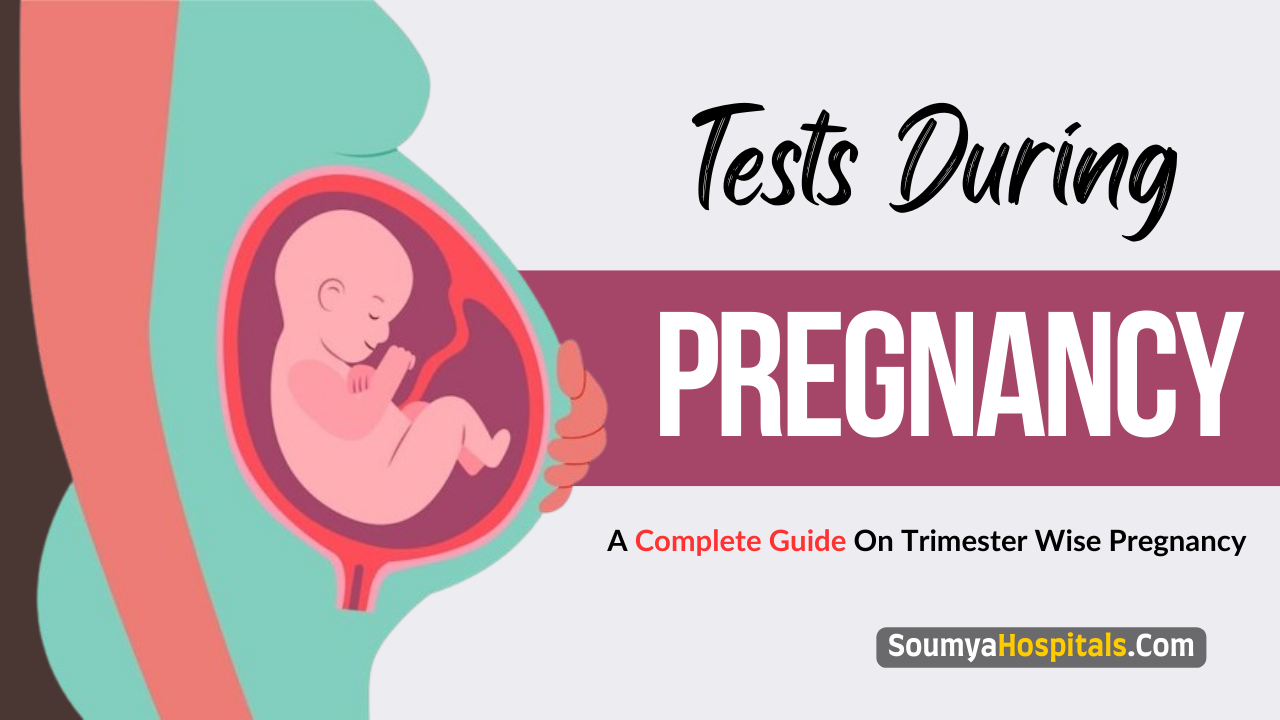Common Tests During Pregnancy: The pregnancy phase is the most amazing yet terrific part of our lives. Every woman from ancient to modern goes through this phase and gives birth.
Conceiving to being prepared for the safe delivery of your baby undergoes plenty of tests/scans/screenings during pregnancy.
Also Check: First Period After Pregnancy
These pregnancy tests and screenings are suggested to be performed in a particular trimester phase. However, the total duration of pregnancy is split into three stages of three months each known as the First Trimester, Second Trimester, and Third Trimester.
So, let's explore urine tests, blood tests, ultrasound pregnancy scan list month wise, routine tests during pregnancy by week, and other screenings during the week wise trimester of pregnancy.
As mentioned, the tests during each pregnancy trimester are highlighted here to provide better knowledge about how many pregnancy tests are and what to do for healthy delivery.
- Brief Details About Pregnancy Tests & Screenings
- List of Common Tests During Pregnancy Trimester-Wise
- USG or Urine or Blood Tests During Pregnancy First Trimester
- Antenatal Screening
- Second Trimester Tests During Pregnancy
- Third Trimester Tests During Pregnancy
- Pregnancy for Women Over 35 Years
- Importance of These Tests During Pregnancy
- Should I Take Any Precautions Before or During The Tests?
- What Are The Risks of Blood Tests During Pregnancy?
- FAQs On Tests During Pregnancy Timeline
Brief Details About Pregnancy Tests & Screenings
Other Name: Pregnancy Panel or Pregnancy Tests Package
Purpose: To evaluate what's happening in both mother and baby development.
Preparation: For most of the tests, Fasting & Drinking plenty of water are preferred
Reporting Time: 8 to 24 Hours for most tests
Pregnancy Tests Price: Differs from one to another
Knowing the common tests during pregnancy and their importance can familiarize you with the test procedures before the day and help you be ready for any pregnancy tests. So get into the main part of this Guide called Trimester-Wise Tests & Screenings During Pregnancy.
List of Common Tests During Pregnancy Trimester-Wise
A mix of blood tests, urine tests, and USG scans are listed here as per the trimesters. Take the below-tabulated list as an opportunity to learn what trimester-wise tests during pregnancy are suggested by the doctors:
| First Trimester (Week 1 - Week 12) | Second Trimester (Week 13 - Week 26) | Third Trimester (Week 27 - Week 40) |
| Beta HCG Test For Pregnancy in First Trimester | GTT (Glucose tolerance test) | Ultrasound Scan In Third Trimester |
| Prenatal Screening Tests (ANC Profile Tests) | USG Level 2 Scan | HIV Test |
| Vitamin D Test During First Trimester Pregnancy | Urine test for preeclampsia | Group B Streptococcus Test |
| Double Marker Test in First Trimester During Pregnancy | Triple Marker Test In Pregnancy | Blood test to check for anemia (Iron profile) |
| Ultrasound NT Scan | Amniocentesis/ NIPT | Doppler Pregnancy |
| Early Pregnancy USG | Chorionic Villus Sampling (CVS) Prenatal Test During Pregnancy | Fetal Echo |
USG or Urine or Blood Tests During Pregnancy First Trimester
Let’s explore the following suggested pregnancy tests, scans, or screenings in the first trimester:
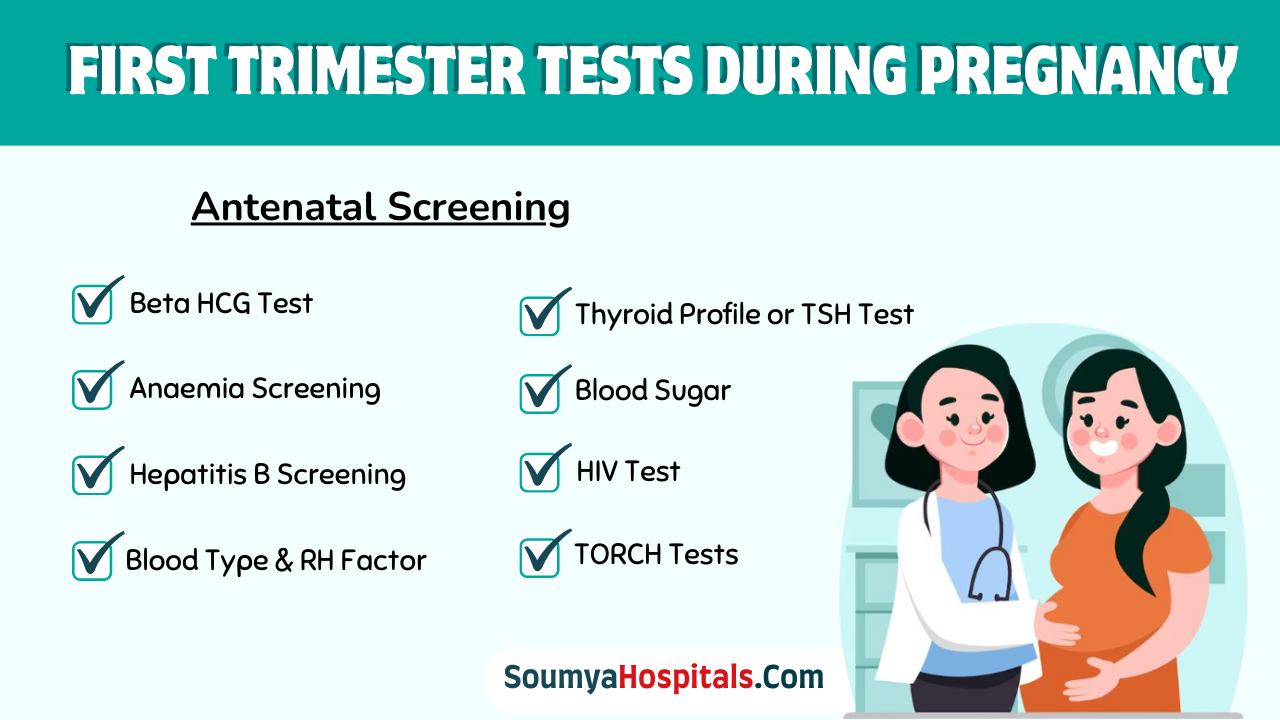
Antenatal Screening - ANC Pregnancy Profile Test List
The most common Antenatal (ANC) test during pregnancy's 1st trimester involves various important Urine and Blood tests. It helps examine the health of the mother and the developing child. Dive in:
Beta HCG Test: The test to identify and confirm pregnancy along with the gestation period. Here is the tabulated format of the hcg level week wise for a better health observation of mother and baby growth.
| Length of pregnancy | Average hCG levels in blood during pregnancy |
|---|---|
| 4 weeks | 0 - 750 µ/L |
| 5 weeks | 200 - 7,000 µ/L |
| 6 weeks | 200 - 32,000 µ/L |
| 7 weeks | 3,000 - 160,000 µ/L |
| 8 - 12 weeks | 32,000 - 210,000 µ/L |
| 13 - 16 weeks | 9,000 - 210,000 µ/L |
| 16 - 29 weeks (second trimester) | 1,400 - 53,000 µ/L |
| 29 - 41 weeks (third trimester) | 940 - 60,000 µ/L |
Anaemia Screening: It deals with the iron levels in the growing fetus of pregnant women and helps control the higher risk of anemia in time.
Hepatitis B Screening: One of the crucial tests since hepatitis B can be transferred from mother to baby and affects the liver.
Blood Type & RH Factor: Help specify blood compatibility, which is important for conceivable blood transfusions. It's essential for RH-negative mothers carrying an RH-positive baby, as complications like hemolytic disease of the unborn can arise when the mother's body builds antibodies against the child's blood.
Blood Sugar: High blood sugar levels during pregnancy could signify gestational diabetes, which poses threats and needs regular monitoring.
Thyroid Profile or TSH Test: Thyroid screening is one more important test during pregnancy to monitor TSH levels, which tend to decrease. Higher levels may indicate an underactive thyroid leads to complications like miscarriage and preterm birth.
HIV Test: It helps determine the risk of HIV transmission from mother to child and is crucial for preventing transmission through the placenta.
TORCH Tests: Screening for German measles (Rubella), syphilis, CMV (Cytomegalovirus), HSV (Herpes simplex virus), and toxoplasmosis is necessary during the first trimester of pregnancy.
Test for Vitamin D Levels
The amount of vitamin D levels in the blood is measured in the Vitamin D pregnancy test. Mostly, growing baby's vitamin D levels rely on the mother's vitamin D status. Hence, a high risk of vitamin D deficiency in the mother leads to a high risk of vitamin D deficiency in infants.
Double Marker Test In Pregnancy
A vital blood test that detects the levels of HCG and PAPP-A. Double marker test can be done between the 9th week and the 4th week of pregnancy.
However, it reports the possibilities of disorders in newborns like Edwards syndrome and Down syndrome. When the fetus encounters a risk of this syndrome, then the pregnant woman will have high levels of HCG and low levels of PAPP-A.
Additional Prenatal Screening Tests In First Trimester
Pregnant women are often offered a combination of blood tests and an ultrasound to check for certain conditions in the baby.
The ultrasound of the Nuchal Translucency Scan measures the amount of fluid at the back of the fetus's neck to assess the risk of chromosomal abnormalities and heart problems.
Other tests, such as Alpha-fetoprotein (AFP), Urine test for albumin, Chorionic Villus Sampling (CVS), and Amniocentesis, may also be recommended. Especially, CVS is the best test for detecting high-risk pregnancies.
Second Trimester Tests During Pregnancy
The tests that you can't avoid during your second-trimester pregnancy phase are explained here for your awareness. Have a look at them:
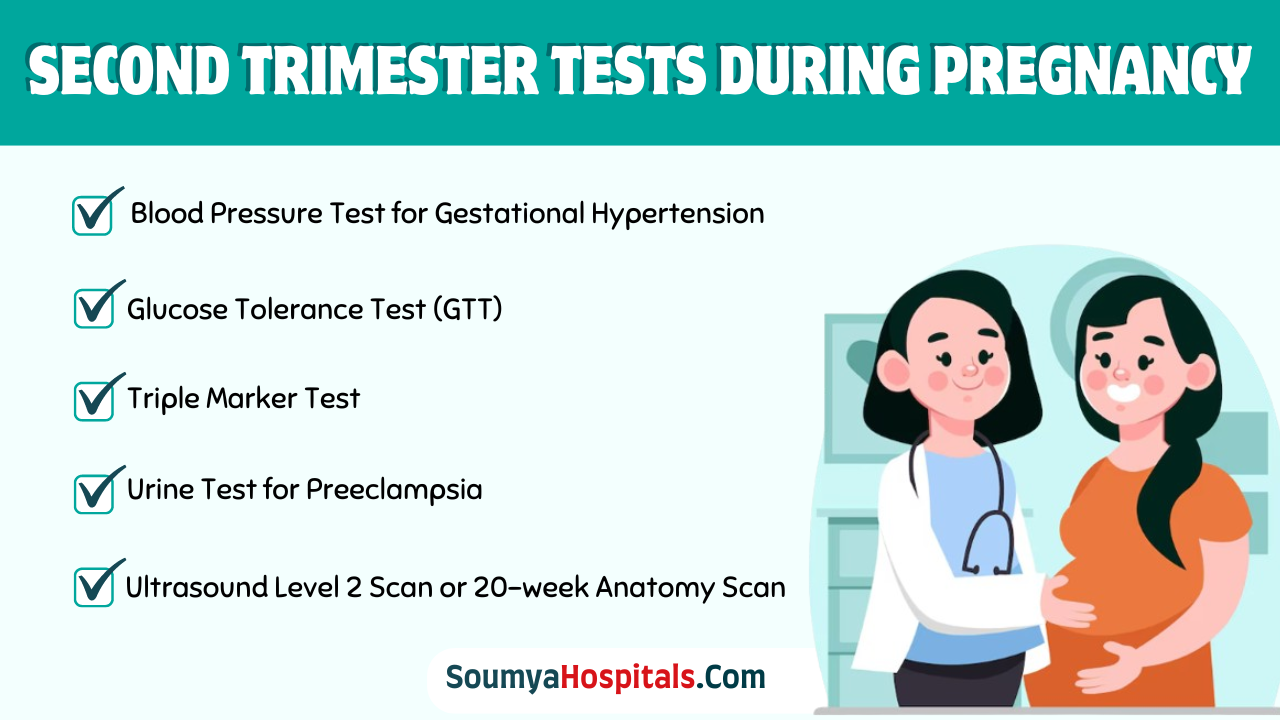
Blood Pressure Test for Gestational Hypertension: This is caused by pregnancy with no symptoms or early signs of preeclampsia. Means protein in the urine.
Glucose Tolerance Test (GTT): The main test during pregnancy's second trimester is GTT as it detects whether you have a risk of gestational diabetes. Usually, diabetes during pregnancy caused due to the placenta making hormones as it boosts sugar in the blood. The best time to do a GTT test is ending of the 2nd trimester week 16 to 18 and also in the 3rd trimester between week 24 and week 28.
Triple Marker Test: This test mainly identifies the risks of Down syndrome, Edwards syndrome, and issues in the spinal cord or brain. You can do a Triple test between 15 and 20 weeks.
Urine Test for Preeclampsia: This urine test is required in the second trimester of pregnancy to detect preeclampsia, a condition marked by high blood pressure and signs of damage to the liver, kidneys, or other organs. If you find any risk after the test, it causes various issues like blood clotting problems and seizures. Having a quick treatment is needed to prevent fatality for the mother and child.
Ultrasound Level 2 Scan or 20-week Anatomy Scan: The recommended time to undergo USG level 2 anomaly scan is between 18 and 20 weeks. This test will be the most precious pregnancy test in the second trimester for parents-to-be. As they can witness small organs of your developing baby through sonography. In even found birth defects, how much amniotic fluid is there, control the cervix, and estimate the birth canal.
All the above common & important tests during pregnancy's second trimester can result positively and negatively. Everyone should follow the Doctors' suggestions during these tests for better outcomes and a healthy pregnancy journey ahead.
Third Trimester Tests During Pregnancy
The Third Trimester Tests & Screenings of Pregnancy are mainly helpful in determining the pregnancy process. Every pregnancy test in the 3rd-trimester phase resembles to detection of larger infections and deficiency issues. The routine tests during the third trimester of pregnancy are listed here with a bit of explanation. Let's read it:
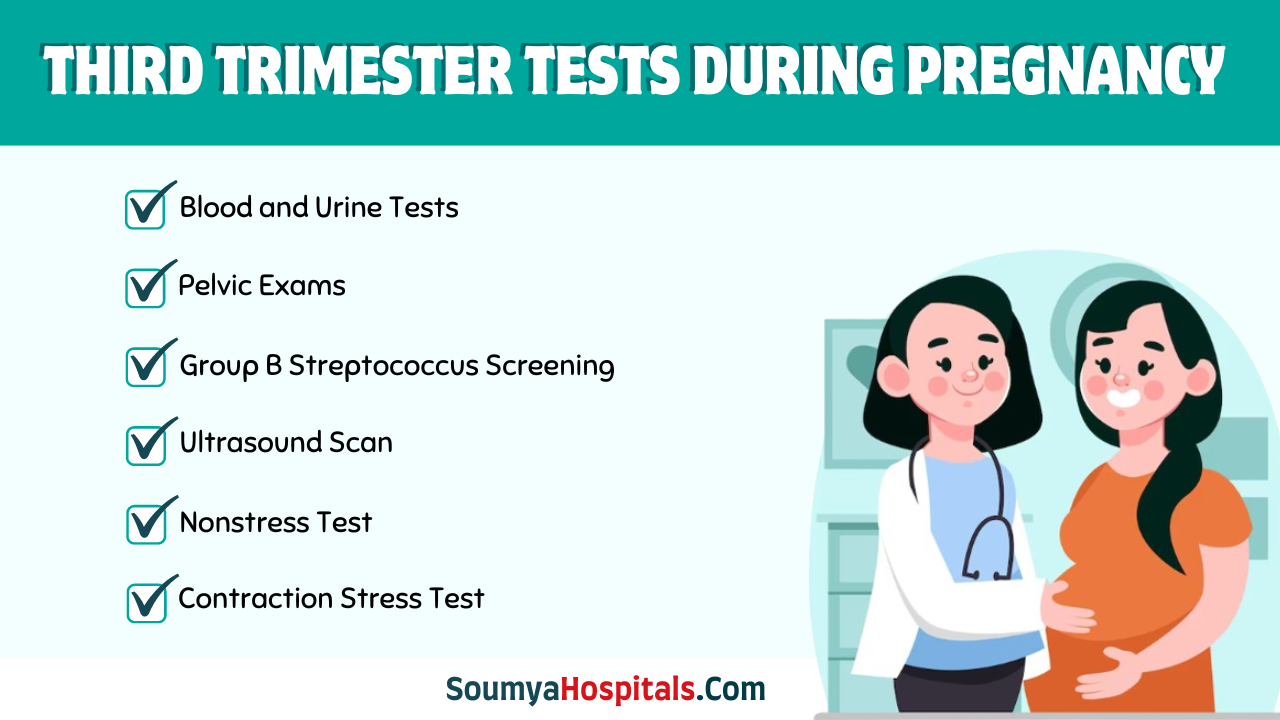
Blood and Urine Tests: Your doctors will recommend taking blood and urine tests during 3rd trimester of pregnancy weeks to keep a close eye on the signs of infection or preeclampsia or any complications at the last minute. The blood tests help to detect anemia in the blood levels.
Pelvic Exams: During the last few weeks of pregnancy, doctors will conduct pelvic exams to check if the cervix has started the ripening process for birth. Ripening directs to the softening, thinning, and opening (dilating) of the cervix. These differences can occur slowly or quickly before birth and may not pursue a precise routine. It's expected to dilate a few centimeters before the due date and then stop dilating, making the process unpredictable.
Group B Streptococcus Screening: The tests like vaginal and rectal swabs are performed between 35 to 37 weeks of pregnancy for identifying Group B Strep Bacteria. As it causes dangerous infections in babies like intellectual disability, impaired vision, and hearing loss. For more information on the Group B streptococcus test, do check the whole guide on our site.
Ultrasound Scan: The safest scan during pregnancy is the USG Scan which uses sound waves and displays the baby's growth and position in the uterus. Parents-to-be with high-risk pregnancies will go through multiple USG Scans in the third trimester.
Nonstress Test: When do you start non-stress tests during pregnancy? You can do this weekly in the worst cases such as high-risk pregnancy, carrying more than one fetus, detecting diabetes and high BP, and measuring the newborn's heart rate. Also, monitors overdue babies.
Contraction Stress Test: It is also done in the last weeks of pregnancy to monitor the baby's heart rate concerning contractions stimulated either by nipple stimulation or oxytocin (Pitocin). The examinations are done by the doctors to estimate how well the baby will deal with the stress of labor.
Pregnancy for Women Over 35 Years
Women over 35 are at high risk of pregnancy complications like Down syndrome, gestational diabetes, miscarriages, and premature birth.
Doctors monitor these pregnancies and may suggest additional tests. The first trimester is particularly vulnerable, and invasive tests for Down Syndrome could cause a miscarriage.
Patients should discuss with their doctor to understand the precautions and responsibilities associated with pregnancy at this age.
Importance of These Tests During Pregnancy
These tests are crucial in many aspects and mainly they help doctors to study the mother and developing baby conditions in the fetus. The explained trimester-wise tests during pregnancy can help identify the following aspects:
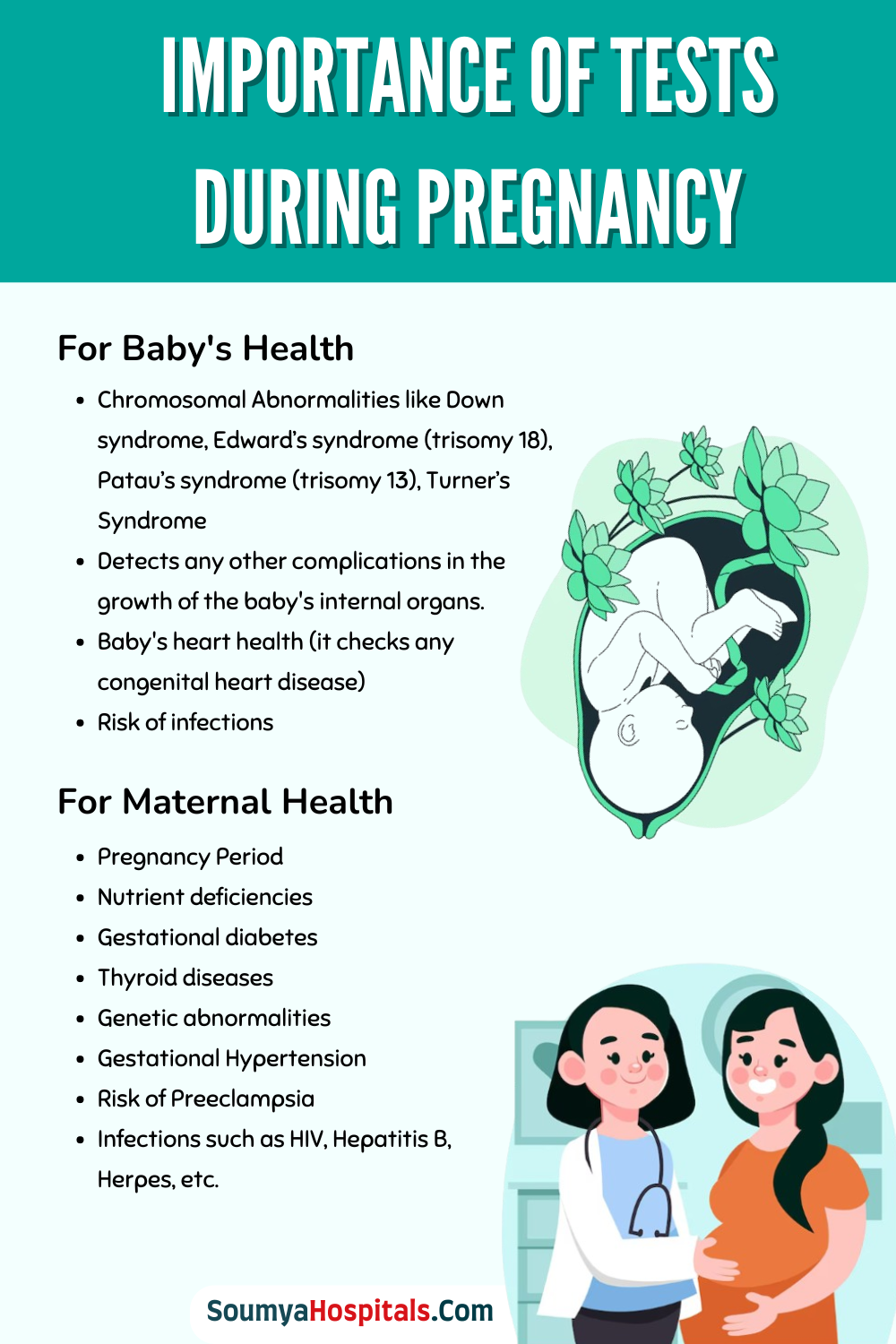
Baby's Health:
- Chromosomal Abnormalities like Down syndrome, Edward’s syndrome (trisomy 18), Patau’s syndrome (trisomy 13), Turner’s Syndrome
- Detects any other complications in the growth of the baby's internal organs.
- Baby's heart health (it checks any congenital heart disease)
- Risk of infections
Maternal Health:
- Pregnancy Period
- Nutrient deficiencies
- Gestational diabetes
- Thyroid diseases
- Genetic abnormalities
- Gestational Hypertension
- Risk of Preeclampsia
- Infections such as HIV, Hepatitis B, Herpes, etc.
Should I Take Any Precautions Before or During The Tests?
All the common and special tests during pregnancy are done by highly professional & reputed diagnosis centers or labs. So, there is no chance of wrong things happening during tests.
However, taking care of the irritation or allergic signs after pregnancy tests is important. Make sure to speak about yourself in front of the lab doctor to avoid such issues and prevent them at the correct time.
Which Antenatal Tests Are Offered During Pregnancy?
| Name | Type of test | Purpose | When to do |
| Infectious diseases screen | Blood test | Immunity to, or presence of, infections such as syphilis, hepatitis, HIV and rubella | First antenatal visit |
| Blood group + antibodies | Blood test | Blood group and Rhesus negative status | First antenatal visit |
| Full blood count | Blood test | Anaemia |
First antenatal visit Repeated at 26 – 28 weeks |
| Vitamin D level | Blood test | Vitamin D deficiency | First antenatal visit |
| Urine test and culture | Urine (wee) test | Infection or signs of abnormalities |
First antenatal visit May be repeated during pregnancy |
| Dating scan | Ultrasound scan | Estimated due date | Usually at 8 – 14 weeks |
| Nuchal translucency test | Ultrasound scan | Screens for genetic abnormalities | From after 11 weeks to before 14 weeks |
| Combined first-trimester screen (CFTS) | Ultrasound scan and blood test | Screens for genetic abnormalities | 11 – 14 weeks |
| Non-invasive prenatal testing (NIPT) | Blood test | Screens for genetic abnormalities | From 10 weeks |
| Chorionic villus sampling (CVS) | Procedure | Diagnoses genetic abnormalities | From 11 weeks |
| Amniocentesis | Procedure | Diagnoses genetic abnormalities | From 15 weeks |
| Morphology scan | Ultrasound scan |
Fetal growth and development Position of the placenta |
18 – 22 weeks |
| Gestational diabetes screening | Blood test | Gestational diabetes | 24 – 28 weeks |
| Group B strep screen | Vaginal or rectal swab | Group B strep | 35 – 37 weeks |
What Are The Risks of Blood Tests During Pregnancy?
The tests in pregnancy diagnosis are quite straightforward and safe. The risks of blood tests during pregnancy are similar to those of any other blood test. These may include:
- If the proper sterilization protocol is not followed or if the needle is contaminated, causes Infection at the puncture site.
- Excessive bleeding at the puncture site may occur. It is important to inform your healthcare provider if you are taking any blood thinners or have any bleeding disorders.
- Minor pain and bruising, which should resolve on their own in a short time.
- If the blood vessel is difficult to locate, multiple punctures may be necessary.
- Feeling light-headed due to stress or heavy bleeding.
- Collecting urine samples and undergoing ultrasounds pose no risk.
FAQs On Tests During Pregnancy Timeline
1. How many blood tests during pregnancy?
There are various types of blood tests involved in pregnancy to check both maternal health and baby's health. The main two maternal serum blood tests are Pregnancy-associated plasma protein screening (PAPP-A) and Human Chorionic Gonadotropin (HCG). Additional blood tests during pregnancy are blood count, blood group, and Rhesus status.
2. Can you refuse blood tests during pregnancy?
Technically, the direct answer to Can I refuse blood tests during pregnancy is NO. However, the choice of performing blood tests during pregnancy is completely upto to the parents-to-be. But they are crucial to protect your newborn.
3. What are the genetic tests during pregnancy used?
Some of the genetic tests done during pregnancy are as follows:
- Alpha-fetoprotein (AFP) test or multiple marker test.
- Cell-free fetal DNA testing.
- Amniocentesis.
- Chorionic villus sampling (CVS)
- Percutaneous umbilical blood sampling
- Ultrasound scan.
4. Can I get a pregnancy scan list month wise from soumyahospitals.com?
Yes, you can even find the list of ultrasound scan test during pregnancy week by week at Soumyahospitals. Meanwhile, check the below list of ultrasound scans during pregnancy trimester wise:
- Early Pregnancy Scan: 1st Trimester
Ultrasound NT/ NB Scan: 1st Trimester
Ultrasound Level 1: 1st Trimester
Ultrasound Level 2/ Anomaly / Tiffa Scan: 2nd Trimester
Growth Scan: 3rd Trimester
Doppler Pregnancy: 3rd Trimester
Fetal Echo: 3rd Trimester
